|
|
|
Sort Order |
|
|
|
Items / Page
|
|
|
|
|
|
|
| Srl | Item |
| 1 |
ID:
092397
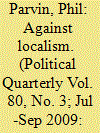

|
|
|
|
|
| Publication |
2009.
|
| Summary/Abstract |
The continued decline in levels of political engagement among British citizens has led many politicians, commentators and academics from across the political spectrum to advocate a move toward a more direct form of democracy via some kind of localism. The claim is that citizens feel increasingly estranged from the democratic process, and from those organisations on which they have historically relied to represent them within the political system. Consequently, localists argue, there now exists a gap between the people, the institutions which are supposed to work on their behalf, and the decisions made in their name, so the system needs to be reformed in such a way as to give individuals and local communities more of a direct input into the decision-making process. Calls for a more direct form of democracy via localism are popular among members of the progressive left and the 'new Conservative' right, and have become so dominant in political discourse that it is often suggested that 'we are all localists now'. This article raises questions about the localist agenda, and suggests that the adoption of a more direct form of democracy in Britain may not only fail to address the decline in political engagement, but may also result in the exclusion, marginalisation, and oppression of minority groups
|
|
|
|
|
|
|
|
|
|
|
|
|
|
|
|
| 2 |
ID:
113137


|
|
|
|
|
| Publication |
2012.
|
| Summary/Abstract |
Are citizens in consensus democracies with developed direct democratic institutions more satisfied with their political system than those in majoritarian democracies? In this article, individual-level data from the second wave of the Comparative Study of Electoral Systems and an updated version of Lijphart's multivariate measure of consensus and majoritarian democracy covering 24 countries are used to investigate this question. The findings from logistic multilevel models indicate that consensual cabinet types and direct democratic institutions are associated with higher levels of citizens' satisfaction with democracy. Furthermore, consensus democracy in these institutions closes the gap in satisfaction with democracy between losers and winners of elections by both comforting losers and reducing the satisfaction of winners. Simultaneously, consensus democracy in terms of electoral rules, the executive-legislative power balance, interest groups and the party system reduces the satisfaction of election winners, but does not enhance that of losers.
|
|
|
|
|
|
|
|
|
|
|
|
|
|
|
|
| 3 |
ID:
142738


|
|
|
|
|
| Summary/Abstract |
Can the people deliberate to set the agenda for direct democracy in large scale states? How might such an institution work? The 2011 California Deliberative Poll piloted a solution to this problem helping to produce proposals that went to the ballot and also to the legislature. The paper reports on how this pilot worked and what it suggests about a possible institution to solve the deliberative agenda setting problem. The legislative proposal passed the legislature but the ballot proposition (Prop 31) failed. However, we show that the proposals actually deliberated on by the people might well have passed if not encumbered by additional elements not deliberated on by the public that drew opposition. The paper ends with an outline of how the process of deliberative agenda setting for the initiative might work, vetting proposals once every two years that could get on the ballot for a greatly reduced cost in signature collections. Adding deliberation to the agenda setting process would allow for a thoughtful and informed public will formation to determine the agenda for direct democracy.
|
|
|
|
|
|
|
|
|
|
|
|
|
|
|
|
| 4 |
ID:
149677
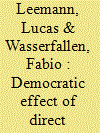

|
|
|
|
|
| Summary/Abstract |
A key requirement of democratic governance is that policy outcomes and the majority preference of the electorate are congruent. Many studies argue that the more direct democratic a system is, the more often voters get what they want, but the empirical evidence is mixed. This analysis explores the democratic effect of initiatives and referendums theoretically and empirically. The prediction of the formal model is that “bad” representation (i.e., a large preference deviation between the electorate and the political elite) is good for the democratic effect of direct democracy. An empirical investigation of original voter and elite survey data, analyzed with multilevel modeling and poststratification, supports this argument. Building on the literature, the findings of the analysis suggest that the extent to which direct democratic institutions are conducive for policy congruence—and may thus be advisable as democratic correctives to representative systems—depends on the political conflict structure.
|
|
|
|
|
|
|
|
|
|
|
|
|
|
|
|
| 5 |
ID:
120133
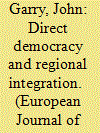

|
|
|
|
|
| Publication |
2013.
|
| Summary/Abstract |
Analyses of voting in European Union referendums typically distinguish between 'second-order' effects and the impact of substantive 'issues'. In order to explain change in referendum outcome, two types of substantive issues are distinguished in this article. Focusing on Irish voting in the Lisbon Treaty referendums and using data from post-referendum surveys, it is found that perceptions of treaty implications outperform underlying attitudes to EU integration in predicting vote choice at both referendums, and perceptions of treaty implications are strong predictors of vote change between the referendums. The findings have broadly positive implications for normative assessments of the usefulness of direct democracy as a tool for legitimising regional integration advance.
|
|
|
|
|
|
|
|
|
|
|
|
|
|
|
|
| 6 |
ID:
168704
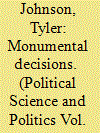

|
|
|
|
|
| Summary/Abstract |
Americans are engaged in a heated, sometimes violent, debate over the fate of Confederate monuments. As communities decide whether to remove these monuments, elected and appointed officials typically have had the final say. What if instead of allowing elected officials to make such decisions, voters had the power? Would this affect how the public feels about the outcome, win or lose? We used a survey experiment to examine whether the mode of decision making affects public attitudes, testing the effects of a decision made by public referendum versus by a city council. We found that respondents view decisions made by referendum to be fairer and more legitimate and allow multiple perspectives to be heard. These results hold even for respondents who oppose the referendum’s outcome. Our results speak to the potential of direct democracy to enhance public acceptance of decisions, particularly when the public is divided.
|
|
|
|
|
|
|
|
|
|
|
|
|
|
|
|
| 7 |
ID:
086974
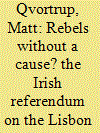

|
|
|
|
|
| Publication |
2009.
|
| Summary/Abstract |
The Irish referendum on the Lisbon Treaty follows a pattern of class-voting also seen in the 2005 referendums on the European Constitution. However, the poll differed in other respects. Polling in the wake of the vote suggested that the main reason given for voting no was a lack of knowledge about the treaty (22 per cent of no voters holding that view). A further 40 per cent of the voters voted no because they claimed not to understand the Treaty. This is in contrast to referendums in 2005 in Spain and the Netherlands where, respectively 70 and 51 per cent, of those with a self confessed 'very limited ' knowledge of the Constitution voted yes.
|
|
|
|
|
|
|
|
|
|
|
|
|
|
|
|
| 8 |
ID:
138879
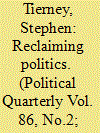

|
|
|
|
|
| Summary/Abstract |
Referendums are often criticised for being elite-controlled and undeliberative. This article argues that the detailed, multiactor regulation of the Scottish referendum resulted in an elaborate legal regime which helped to overcome these potential pathologies, diluting executive control and facilitating an exercise in national public engagement. It addresses the troubled history of referendum use in the UK and contends that the Scottish process may well transform how referendums are now viewed. Indeed, one outcome of the Scottish process is likely to be a greater demand at UK level for the use of direct democracy in processes of significant constitutional change. It is by no means certain, however, that these demands for greater popular engagement in the process of constitutional change will be met, particularly when we consider the Smith Commission process, which marks a return to elite interparty bargaining.
|
|
|
|
|
|
|
|
|
|
|
|
|
|
|
|
| 9 |
ID:
116408
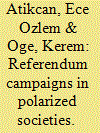

|
|
|
|
|
| Publication |
2012.
|
| Summary/Abstract |
Can referendum mechanism be used in deeply polarized societies without invoking existing cleavages? This question is tackled by studying two recent Turkish constitutional referenda, which took place in 2007 and 2010. Turkish society and politics are highly polarized along the secular versus pro-Islam axis. Based on an in-depth study of the campaign materials, media content analysis, and survey data from both cases, it is demonstrated that although both referendum proposals were related to secularism in Turkey, this cleavage was more visible in the 2010 vote. If political parties choose to treat referenda as elections, voters' predispositions are more likely to be reinforced, and partisan voting is more likely to prevail. This research shows that controlled comparisons help in understanding the role of party politics in direct democracy.
|
|
|
|
|
|
|
|
|
|
|
|
|
|
|
|
| 10 |
ID:
160354
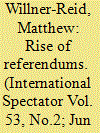

|
|
|
|
|
| Summary/Abstract |
Perhaps the most notable development of the second half of the twentieth century, and its greatest achievement, is the rapid global spread of two institutions: democracy and multilateralism. These institutions have collectively made us safer and more prosperous than any previous generation in history. But could the two now be coming into conflict? Recent experience regarding the EU suggests both that referendums as a tool of foreign policy decision-making are likely to become more common in the future, and that they pose major risks for multilateralism and international cooperation.
|
|
|
|
|
|
|
|
|
|
|
|
|
|
|
|
| 11 |
ID:
120131
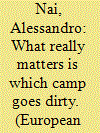

|
|
|
|
|
| Publication |
2013.
|
| Summary/Abstract |
Using individual data on Swiss federal ballots (VOX data) and an original dataset on the evolution and content of political campaigns, this article elucidates how negative campaigning influences individual turnout during Swiss federal ballots. It hypothesises that the effect of negativism on turnout depends on 'which camp goes dirty' and, specifically, on the direction of the political campaign ('status quo' versus 'policy change' campaigns). A series of multilevel models provide strong support for the hypotheses, by showing that high negativism in 'status quo campaigns' decreases individual turnout, whereas high negativism for 'policy change campaigns' increases it. It is argued here that this could depend on the emotional responses triggered by negativism in political campaigns.
|
|
|
|
|
|
|
|
|
|
|
|
|
|
|
|
|
|
|
|
|